Survivors share vivid accounts of perils they faced as children
On the night of Nov. 9-10, 1938, members of the Nazi party sponsored anti-Jewish riots (pogroms) which attacked Jewish persons and destroyed Jewish owned property in Germany and Austria. Known as “Kristallnacht, the Night of Broken Glass,” this event is regarded by historians as “the Night the Holocaust began” in Europe, which ultimately led to the murder of more than six million Jews.
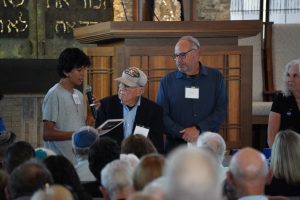
To ensure no one ever forgets those events and to stand united in saying “Always Remember!” “Never Forget!” and “Never Again!” the Catholic-Jewish Dialogue of Collier County (CJD) hosted its 22nd annual “Kristallnacht: The Night of Broken Glass” commemoration Nov. 9, 2025, at Temple Shalom in Naples. The event was co-sponsored by the Diocese of Venice and Jewish Federation of Greater Naples, GenShoah of SWFL, and the Holocaust Museum and Janet G. and Harvey D. Cohen Education Center.
Marty Gauthier, Co-Chair of the CJD, shared the regrets of Bishop Frank J. Dewane, who was unable to attend the important interreligious commemoration due to a meeting of the U.S. Conference of Catholic Bishops. Gauthier emphasized that Bishop Dewane has always been, and remains, wholeheartedly committed to the mission of the Catholic-Jewish Dialogue.
Gauthier also shared the mission of the CJD, which is to promote an understanding of the mutual and shared history of the Catholic and Jewish faiths, and to advance acceptance of their differences and commonalities in a setting of respect, trust, faith, and hope.
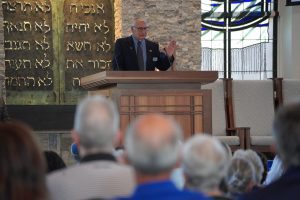 During the commemoration, Erin Blankenship, President and CEO of the Holocaust Museum & Cohen Educational Center in Naples, introduced a Kristallnacht film, which included firsthand accounts of the “Night of Broken Glass.” During the horrific night, the organized Antisemitic acts of violence damaged or destroyed more than 1,400 synagogues, vandalized thousands of Jewish-owned businesses, broke into Jewish people’s homes, and desecrated religious objects. The rioters also humiliated, assaulted and killed hundreds of Jewish people. In addition, 26,000 were arrested and sent to prisons and concentration camps. This was the end, at this time in history, of any hope of having Jews continuing to safely live in Germany.
During the commemoration, Erin Blankenship, President and CEO of the Holocaust Museum & Cohen Educational Center in Naples, introduced a Kristallnacht film, which included firsthand accounts of the “Night of Broken Glass.” During the horrific night, the organized Antisemitic acts of violence damaged or destroyed more than 1,400 synagogues, vandalized thousands of Jewish-owned businesses, broke into Jewish people’s homes, and desecrated religious objects. The rioters also humiliated, assaulted and killed hundreds of Jewish people. In addition, 26,000 were arrested and sent to prisons and concentration camps. This was the end, at this time in history, of any hope of having Jews continuing to safely live in Germany.
The annual commemoration included a candle lighting ceremony. Nine candles were lit by Gen Shoah (first- second- and third-generation Holocaust survivors), joined by teens from St. William Parish in Naples. Each lit their candle for the victims of the Holocaust and for a brighter future.
Among the survivors to speak was Heinz Wartski, who was 9-years-old living in Danzig, Germany, when Kristallnacht took place. He recounted how terrifying it was to be a witness to the destruction of his community and the burning of the synagogue. His family emigrated to Italy on fake passports before the start of World War II. There the family joined the Italian partisans fighting fascism before being liberated by Allied troops. He later served in the U.S. Army during the Korean War and is a disabled veteran.
Another speaker was Robert Hilliard, 100-years-old, a World War II U.S. Army veteran who helped liberate a camp. Hilliard shared that while serving in post-war Germany, he, and a fellow soldier, became outspoken advocates for the care of the Jewish liberated survivors of the Holocaust by the U.S. Army. He reported the mistreatment of survivors and corruption in the U.S. military, eerily similar to how they were treated by the Nazis. Hilliard’s efforts gained national attention, forcing President Harry S. Truman to direct a more humane treatment of the Holocaust survivors.
Antonio Giacalone, a member of the St. William Parish youth group, was among the teens to speak, “As a Catholic teenager, I stand in sorrow. Though I come from a different faith, I mourn the Jewish lives lost. Their memory matters to me, to all of us. May this light (of the candle) shine as a light that we may never forget their suffering and that we will stand against hatred in every generation.”
Also participating in the commemoration was Father Mark Harris, who, along with Rabbi Mark Gross of the Jewish Congregation of Marco Island, recited the Mourner’s Kaddish. The closing benediction was offered by Rabbi Ammos Chorny of Beth Tikvah Congregation in Naples.
The CJD is affiliated with Jewish Federation of Greater Naples and the Collier County Parishes of the Diocese of Venice.
Box
Catholic-Jewish symposium coming to Ave Maria and Naples in December
The Catholic-Jewish Dialogue of Collier County, a longstanding Southwest Florida interfaith partnership, is hosting a panel of distinguished theologians, professors and clerics to discuss the impact of the historic document that changed 20 centuries of Catholic-Jewish relations. Bishop Frank J. Dewane is among the panelists. The two-day symposium, titled “Nostra Aetate – 60 years: A new path for Catholic-Jewish relations,” will be held at 2 p.m., Dec. 6, 2025, at Ave Maria University, and 2 p.m., Dec. 7 at the Jewish Federation of Greater Naples, 4630 Pine Ridge Road, Naples. The same program will be presented for two consecutive days. This is the 60th anniversary of Nostra Aetate (In Our Time), a Catholic document created during the Second Vatican Council. Among other things, the document repudiated anti-Semitism and the charge that Jews were collectively guilty for the crucifixion of Jesus Christ. It calls for interfaith dialogue to promote a better understanding of each other’s faith, emphasizes the spiritual connection of humanity, promotes a mutual respect among all religions, and rejects all forms of discrimination and antisemitism. Register for the symposium at www.jewishnaples.org.






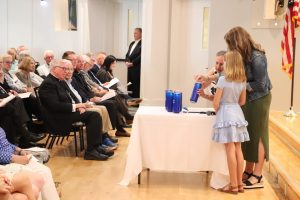
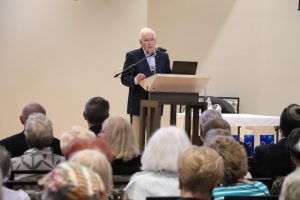 Koenigsberg was nearly eight when Allied forces liberated the Netherlands in 1945 and he later reunited with his parents, but he never saw his grandfather and many other family members again. During those two years in hiding, his home was a small cottage in a Nazi-controlled village in southern Holland, hidden away by the Snijckers, a sympathetic couple with four children of their own.
Koenigsberg was nearly eight when Allied forces liberated the Netherlands in 1945 and he later reunited with his parents, but he never saw his grandfather and many other family members again. During those two years in hiding, his home was a small cottage in a Nazi-controlled village in southern Holland, hidden away by the Snijckers, a sympathetic couple with four children of their own.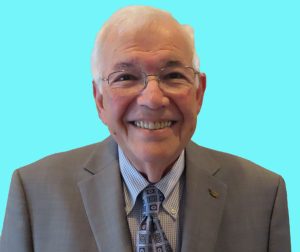 The guest speaker is John Koenigsberg, who will share his Holocaust survival story. In the spring of 1943, 5-year-old John was brought to the home of Johannes and Anna Snijckers by the Dutch resistance. The Catholic family protected John despite the risk of great personal danger by the occupying Nazis. Koenigsberg was lovingly accepted by “Mama and Papa” Snijckers as their fifth child and was welcomed by the couple’s other four children as their little brother. He attended the same Catholic primary school as the other children and was reunited with his parents at the end of the war.
The guest speaker is John Koenigsberg, who will share his Holocaust survival story. In the spring of 1943, 5-year-old John was brought to the home of Johannes and Anna Snijckers by the Dutch resistance. The Catholic family protected John despite the risk of great personal danger by the occupying Nazis. Koenigsberg was lovingly accepted by “Mama and Papa” Snijckers as their fifth child and was welcomed by the couple’s other four children as their little brother. He attended the same Catholic primary school as the other children and was reunited with his parents at the end of the war.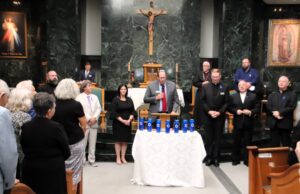
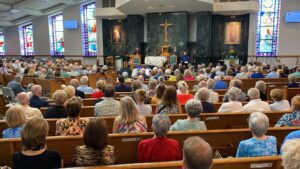
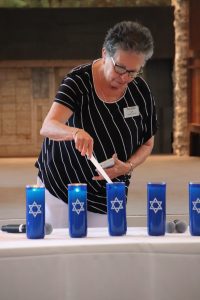 To remember those events, the Catholic-Jewish Dialogue of Collier County hosted its annual “Kristallnacht: The Night of Broken Glass” Nov. 5, 2022, at Temple Shalom in Naples. The event was co-sponsored by the Diocese of Venice and Jewish Federation of Greater Naples, GenShoah of SWFL, and the Holocaust Museum and Janet G. and Harvey D. Cohen Education Center.
To remember those events, the Catholic-Jewish Dialogue of Collier County hosted its annual “Kristallnacht: The Night of Broken Glass” Nov. 5, 2022, at Temple Shalom in Naples. The event was co-sponsored by the Diocese of Venice and Jewish Federation of Greater Naples, GenShoah of SWFL, and the Holocaust Museum and Janet G. and Harvey D. Cohen Education Center.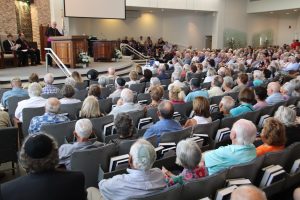 “Each one of us has a responsibility to take action when we see anti-Semitism,” Bishop Dewane continued. “It isn’t just for the Dialogue group to resolve. It isn’t just for a Parish or synagogue. It’s for all of us to come together when we see the negativity that can rears its head, just as it did so many years ago when Kristallnacht foreshadowed what the world never thought could happen (the Holocaust) – and it did happen. You and I have responsibilities to speak out and to speak up.”
“Each one of us has a responsibility to take action when we see anti-Semitism,” Bishop Dewane continued. “It isn’t just for the Dialogue group to resolve. It isn’t just for a Parish or synagogue. It’s for all of us to come together when we see the negativity that can rears its head, just as it did so many years ago when Kristallnacht foreshadowed what the world never thought could happen (the Holocaust) – and it did happen. You and I have responsibilities to speak out and to speak up.”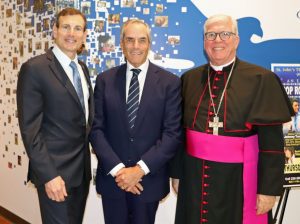 To commemorate those events, the Catholic-Jewish Dialogue of Collier County hosted its annual “Kristallnacht: The Night of Broken Glass” Nov. 17 at St. John the Evangelist Parish in Naples. The event, now in its 16th year, was co-sponsored by the Diocese of Venice and Jewish Federation of Greater Naples.
To commemorate those events, the Catholic-Jewish Dialogue of Collier County hosted its annual “Kristallnacht: The Night of Broken Glass” Nov. 17 at St. John the Evangelist Parish in Naples. The event, now in its 16th year, was co-sponsored by the Diocese of Venice and Jewish Federation of Greater Naples.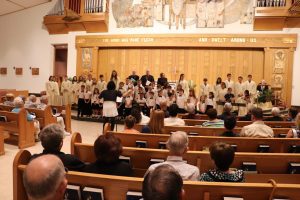 Here in the Diocese of Venice, Bishop Frank J. Dewane hosts an annual interreligious gathering of Yom HaShoah: An Hour of Remembrance. This year the event was held on April 15 at Epiphany Cathedral, Venice, just a few days after April 11, the traditional Remembrance Day.
Here in the Diocese of Venice, Bishop Frank J. Dewane hosts an annual interreligious gathering of Yom HaShoah: An Hour of Remembrance. This year the event was held on April 15 at Epiphany Cathedral, Venice, just a few days after April 11, the traditional Remembrance Day.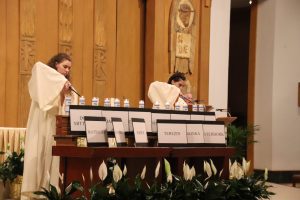 Afterwards the guests went to a reception in the Parish Hall where there were also displays of research projects done by middle schoolers from Epiphany Cathedral and St. Martha Catholic schools. These covered topics of research on the stories of those whose lives were taken too soon, or of the incredible story of survivors.
Afterwards the guests went to a reception in the Parish Hall where there were also displays of research projects done by middle schoolers from Epiphany Cathedral and St. Martha Catholic schools. These covered topics of research on the stories of those whose lives were taken too soon, or of the incredible story of survivors.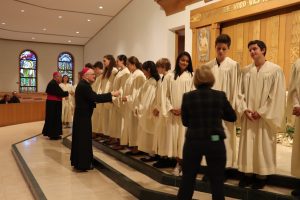 Bishop Dewane spoke briefly about the need for such gatherings which bring together members of the Catholic and Jewish communities to recommit to the promotion of peace and solidarity among all peoples.
Bishop Dewane spoke briefly about the need for such gatherings which bring together members of the Catholic and Jewish communities to recommit to the promotion of peace and solidarity among all peoples.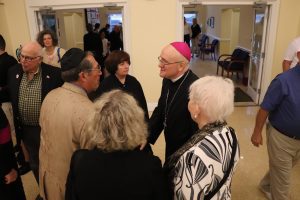 One way to help avoid this is the ongoing effort of the Catholic Schools in the Diocese to have comprehensive program to educate middle and high school students on the Holocaust through various means, explained Dr. Kristy Swol, Diocese Director of Education. “It is hoped that by learning about the Holocaust, they learn about the past and also how to protect the future,” Swol concluded.
One way to help avoid this is the ongoing effort of the Catholic Schools in the Diocese to have comprehensive program to educate middle and high school students on the Holocaust through various means, explained Dr. Kristy Swol, Diocese Director of Education. “It is hoped that by learning about the Holocaust, they learn about the past and also how to protect the future,” Swol concluded.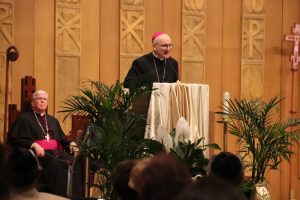 Bishop Massa spoke about the need to properly develop one’s conscience to respond to injustices such as the Holocaust. Using the example of the White Rose Society, a group of university students who were publicly against the atrocities that the Nazi regime and did so by distributing leaflets at their school and throughout Munich, Germany in early 1943.
Bishop Massa spoke about the need to properly develop one’s conscience to respond to injustices such as the Holocaust. Using the example of the White Rose Society, a group of university students who were publicly against the atrocities that the Nazi regime and did so by distributing leaflets at their school and throughout Munich, Germany in early 1943.